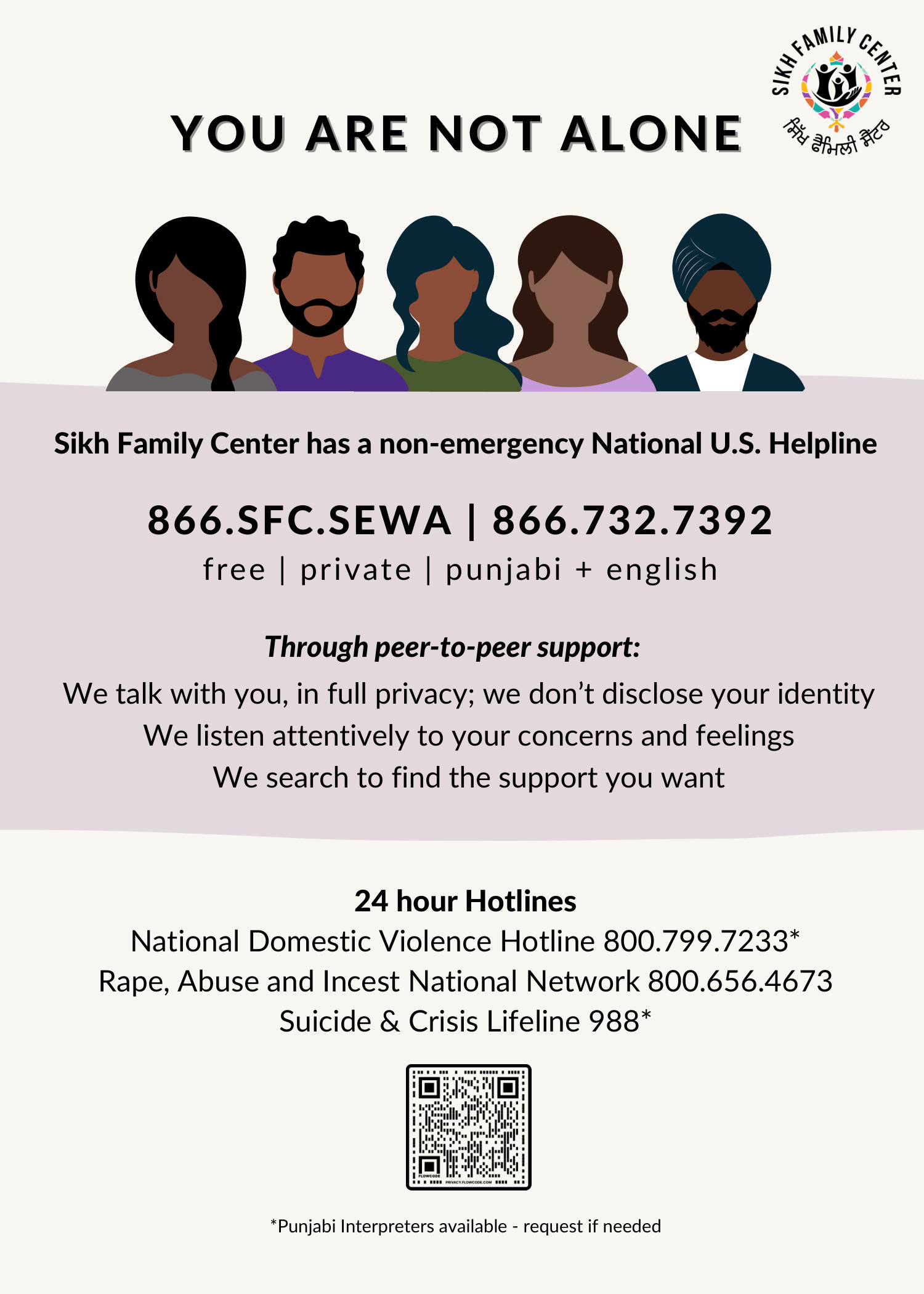
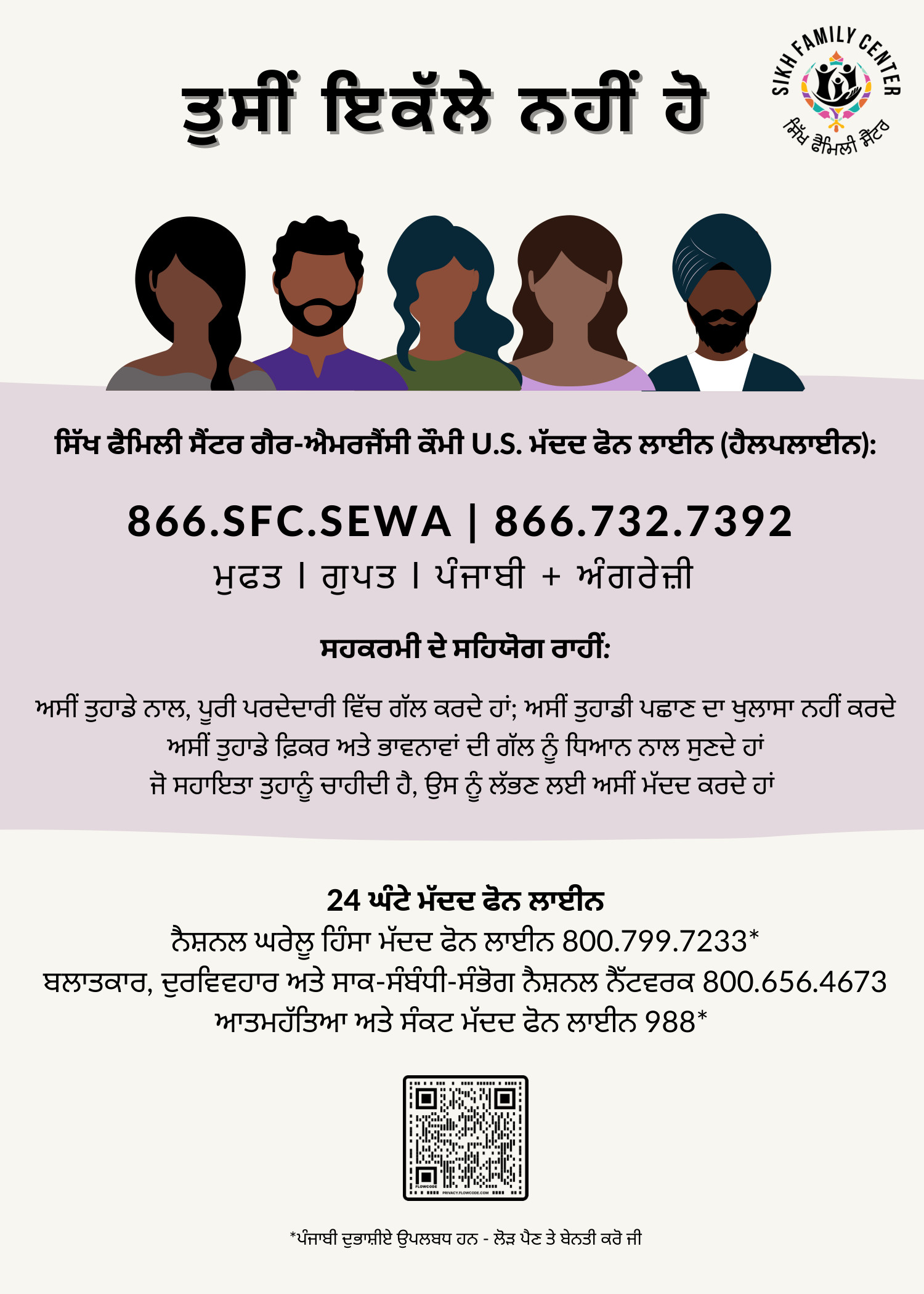

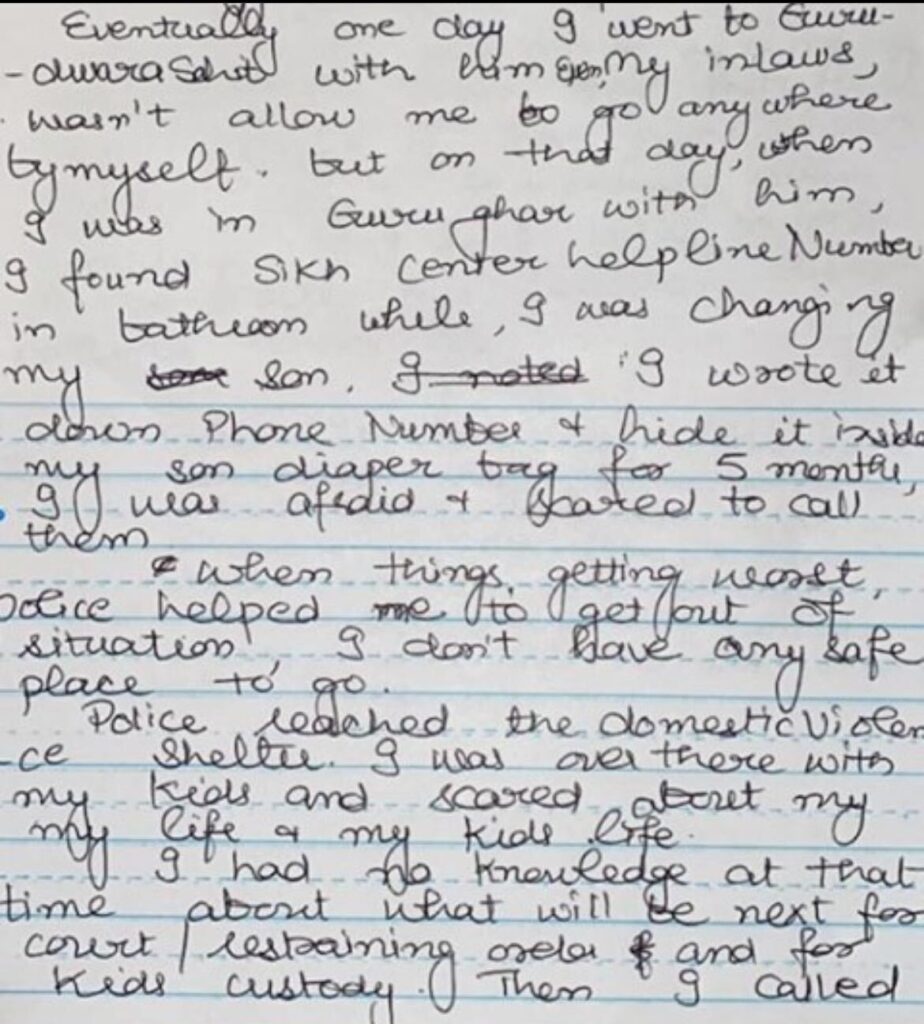
“I found Sikh [Family] Center Helpline Number in bathroom while I was changing my son. I wrote it down… and hide it inside my son diaper bag for 5 months…”
Years after finding safety, employment independence, and a bright future for her two kids, a survivor of domestic violence remembers how she first heard of Sikh Family Center. She reflects on mustering her strength to make the first call, and over the last 8 years, she’s in touch with us. She is raising two healthy children away from the physical and sexual and emotional violence that once threatened her life gravely. Trauma-recovery and healing have no timeline. But you are not alone; there is always support and assistance. We Stand Tall With Survivors.
We are Here for You
At Sikh Family Center we realize that reaching out for support can feel uncertain when you are experiencing family violence, sexual violence, or other forms of gender-based violence. Everyone’s journey is unique, and it is natural to have questions or hesitations about calling the helpline.
We are here to provide a safe, non-judgmental space whenever you feel ready to connect. Whether you decide to reach out now or later, your feelings and choices are valid.
Our trained, compassionate community volunteers (known as peer counselors) are here to support you with trauma-centered, culturally responsive support in Punjabi and English.
We listen attentively to help you process your thoughts and feelings, help identify your needs and explore options together.
We connect you to community-appropriate resources, provide specific referrals and strive to provide accurate information for your physical and emotional safety, including legal information.
We offer ongoing support – you are welcome to call us and talk whenever you need to again: tomorrow, next month, or next year.
We are committed to your wellbeing
Our services are always free of charge for Helpline callers.
We always prioritize safety and 100% privacy – we never disclose your identity or the details you share to anyone without your explicit permission.
You control what information you share with us – we do not ask for any identifying information you do not wish to share: we do not collect any identifying information.
We do not place shame, discriminate against, or blame anyone for the situation they find themselves in.
Please note that we do not provide legal advice or legal services. We also do not provide medical services and are not mental health providers. We can connect you with professionals who can offer these services.
Here is what to do when you call our Helpline:
Choose your language:
You will hear a greeting in both Punjabi and English. Select the language you prefer to speak in.
Leave a Message:
Briefly tell us the reason for your call.
You can use any name you are comfortable with – your first name or even a nickname.
Let us know the best number to reach you at.
Tell us if it is safe to call you back, including a safe time to call back.
Let us know if it is safe for us to leave a voicemail.
We will call you back:
A trained, bilingual (Punjabi/English) peer counselor will contact you within 48 hours.
Your Safety Matters:
If you do not tell us that your number is safe, at least at certain times, we will not be able to call you back.
Please Note:
Our Helpline is not an emergency hotline. We do not answer calls live.
If you need urgent help, please refer to additional hotlines under ‘More Resources’
Important: Calling history can sometimes be monitored by the person causing abuse. If you are concerned about your call history, consider using a device that is not accessible to others. For more on Technological Safety, including Phone Safety, please visit Safety Net Project.
Our Peer Counselors are community volunteers/sevadaarnis who are Sikhs from across the U.S., and have been selectively invited due to their unique backgrounds, trainings, and commitment to our community and equity. They are further trained by Sikh Family Center in trauma-centered, culturally responsive, domestic violence/crisis intervention skills.
When you leave a message on our voicemail, one of our bilingual (Punjabi/English) peer counselors will return your call within 48 hours.
Note: they will not call or leave a message unless you let us know it is safe to call you back and/or leave a message. Please see: ‘What you will hear when you call the Non-Emergency National U.S. Helpline’
Our compassionate peer counselors talk to you in full privacy, listen attentively to help you process your thoughts and feelings, help identify your needs and explore options with you.
They connect you to community-appropriate resources, provide specific referrals and strive to provide accurate information for your physical and emotional safety.
Anonymous sevadaarnis/volunteers:
Our community, interconnected across the U.S. and even the world, can sometimes feel small when it comes to keeping private information private. We value the importance of privacy for both you and our peer counselors. Our peer counselors do not identify themselves publicly as “peer counselors.” This protects them – and our callers who may be working with them for weeks or months or even years – from potential recognition in our close-knit sangats, such as at a Gurdwara or a social gathering.
By maintaining this level of privacy, we hope to offer a safe space for open, honest conversations. Speaking with anonymous peer counselors can help callers feel more comfortable sharing sensitive issues and feel confident they are receiving support without judgment.
Experiencing gender-based violence or other trauma can feel isolating, but you are not alone. At Sikh Family Center, our peer counselors walk alongside you on this journey, supporting you at your own pace, without judgment.
We recognize this is your path, and we want you to know that healing is possible, on your own terms.
You have options – call our Helpline to learn more.
We offer resources to help you support someone experiencing family violence or sexual violence. Know the facts, safety plan, learn what to do and what not to do when supporting survivors, as well as how to navigate trauma.
We encourage anyone who has concerns or questions to reach out to our Helpline to talk to a trained peer counselor.
We treat all our callers with respect and never turn anyone away. Recognizing that you need help is the first step towards change.
Those willing to take responsibility for their actions and wanting to change should have opportunities to receive services (including, if applicable, for past traumas or current diseases like alcoholism).
We encourage anyone who has concerns or questions to reach out to our Helpline to talk to a trained peer counselor.
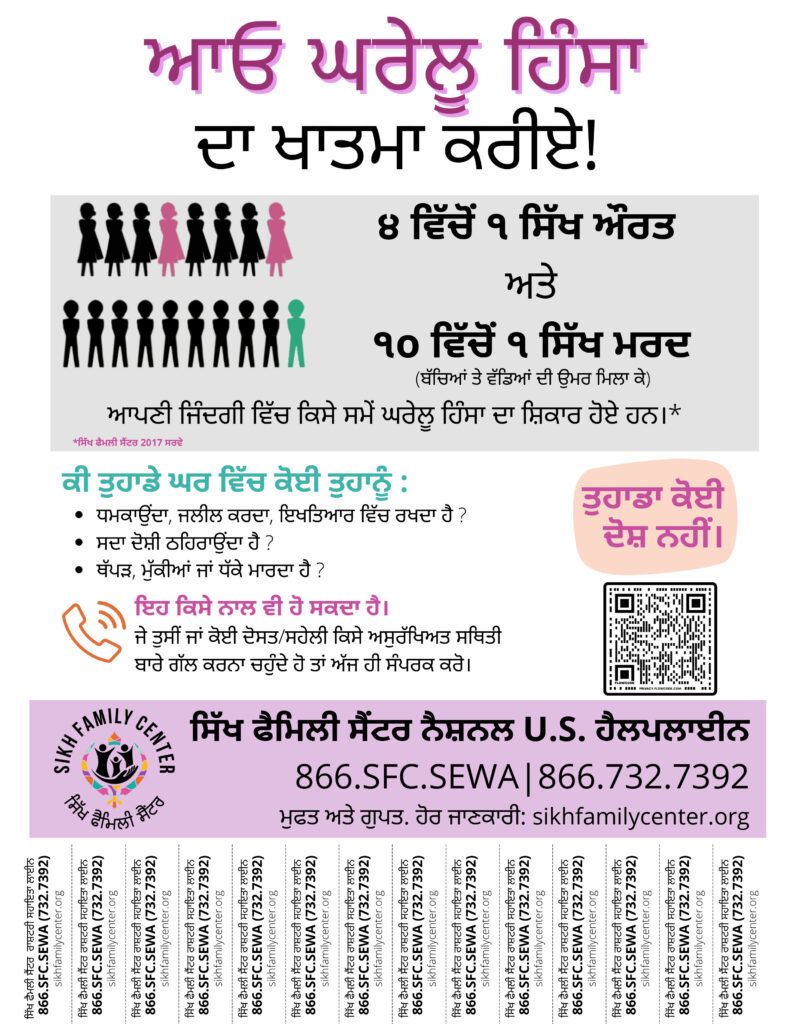
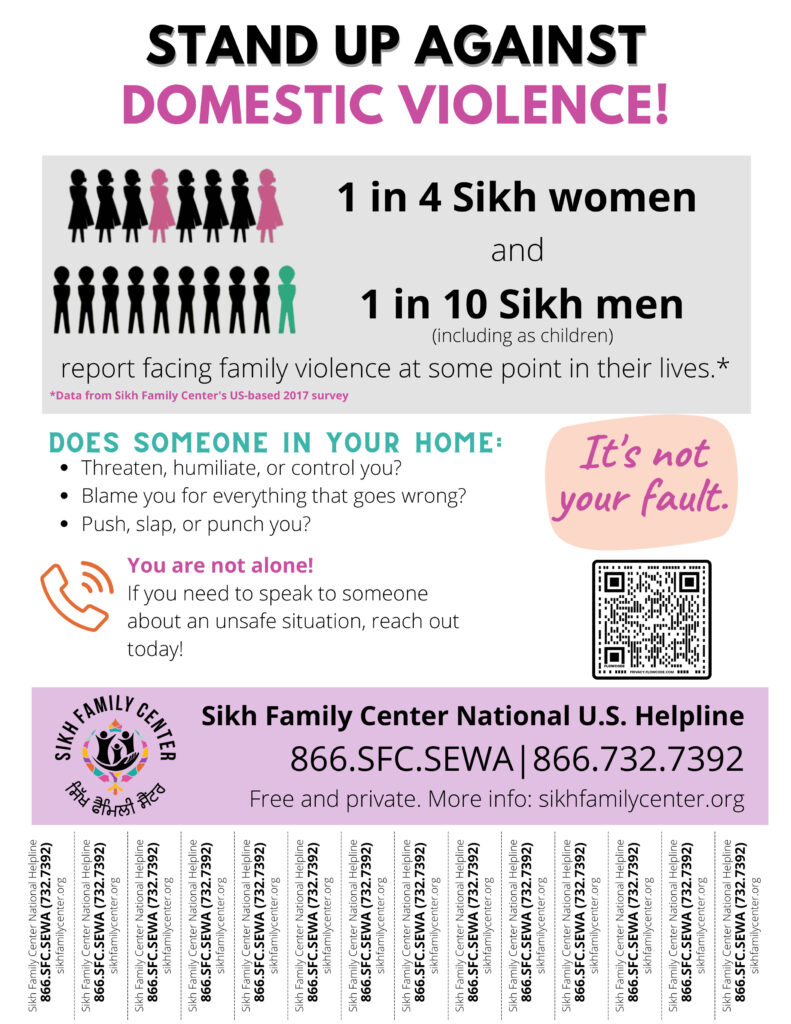
Contact
National U.S. Helpline
866-SFC-SEWA or (866)-732-7392
Sikh Family Center is a national nonprofit organization in the U.S. that promotes community well-being with a particular focus on gender justice. We provide trauma-centered resources for victim-survivors of violence while working to change the social and cultural conditions that allow gendered violence to occur in the first place. Our training, outreach, and advocacy are grounded in cultural tradition, grassroots power, and intergenerational healing.
All Rights Reserved © Sikh Family Center